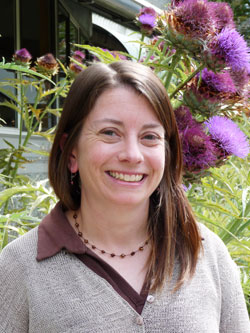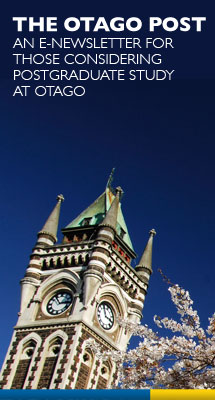 Monday 16 June 2014 3:14pm
Monday 16 June 2014 3:14pm
OUSA New Supervisor of the Year,
Dr Susan Sandretto, describes herself as a
'mid-wife' and 'cheerleader' providing the
'scaffolding' to support a postgraduate's
study.
A 'mid-wife', a 'cheerleader' providing the 'scaffolding' to support a postgraduate's study – the 2008 OUSA New Supervisor of the Year, Dr Susan Sandretto, describes herself in all these ways.
"Getting a postgraduate degree is an apprenticeship in research. Someone shows you the ropes," says Susan, an ex-primary school teacher who came to New Zealand from California in 1997, gained her doctorate at Otago in 2004 and now lectures within the College of Education.
Susan regards supervising postgraduates as "exciting and a privilege. I get to engage with fields I'm aware of but not actually researching myself, so I'm learning all the time. If a student is a bit unconfident, I'm saying 'yes you can!'"
A keen communicator, Susan supports her postgraduate students with one-on-one meetings, emails, texts and fortnightly lunch-time group meetings.
"Different people work differently," she observes. "Some just get on with it; some people need help to set a timetable. I try to tailor my supervision to each student. I set lots of little deadlines to keep things ticking along."
At the group meetings, her students talk about key issues in their thesis, where they are at and they give each other new ideas for where to go for material. "We also use that time to have dry runs of presentations, whether it's for a conference or their thesis," adds Susan.
"We look out for conferences they could attend and work on putting a conference presentation together so they are comfortable with these scenarios. Wherever they go on to work they'll always need these skills."
Susan also tries to further her relationships, so she gets to think about the whole student rather than just the chapter they have given her to read.
"I have a pastoral care focus. Postgraduates have lives outside of study that often involve partners or children. I try to make sure everyone has a healthy work-life balance. A lot of study is done on your own, but you are not a solo sailor in this."
Susan says a fundamental part of supervising a postgraduate is helping to map out where their research is heading and figuring out where their work sits nationally and internationally.
"There is always the 'so what?' factor in choosing a research topic," Susan says. "So what does it mean for teachers in the classroom, for education policy? But, at the end of the day, it's their work. While I give them guidance, they can still take or leave my advice. You need to be flexible."
Susan feels tremendously rewarded by her supervisory work. "Knowing my students took time out of their busy days to put together an argument for my OUSA award – it's a huge compliment."
